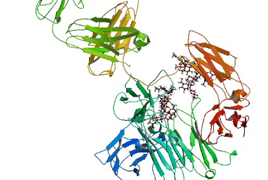The aim of the study: Retrospective evaluation of the first 12 months treatment of macular edema in BRVO with ranibizumab based on anatomical and functional parameters.
Methods: 54 eyes with macular edema complicating BRVO were included in the study, with an average initial best corrected visual acuity 4/16 ETDRS charts, an average central retinal thickness 512.3 μm, and in average 4 months till the beginning of treatment with ranibizumab. After 3 initial injections of 0.5 mg ranibizumab treatment was performed in pro re nata regimen, with adjuvant laser (grid laser photocoagulation) as an additional treatment option. The number of injections administered, the number of eyes where grid laser photocoagulation was provided, functional parameters as a letter gain and BCVA (eyes with final BCVA ≥ 4/8 ETDRS, final BCVA in according to initial BCVA) and anatomical parameters as a mean CRT and CRT ≤ 250 μm, respectively ≤ 300 μm were evaluated.
Results: In the whole group, an average of 4.8 injections of ranibizumab were administered in the first 12 months. Grid laser photocoagulation was performed in 42 eyes: in 8 eyes prior to the beginning of treatment with ranibizumab, 7 eyes before and during the treatment, 29 eyes only during the treatment. The main gain of letters after 12 months of treatment was +16.5 letters, with 63¨% (n = 34) eyes earning ≥ 15 letters. In the whole group 72 % (n = 39) eyes achieved the resulting BCVA ≥ 4/8 ETDRS after 12 months of treatment. The eyes with initial BCVA ≥ 4/10 ETDRS resulted in BCVA ≥ 4/8 ETDRS in 96 % (n = 23 eyes) and 11 eyes even achieved BCVA ≥ 4/4. The mean CRT after 12 months of treatment was 290.3 μm, 33.3 % of eyes had final CRT ≤ 250 μm, and 64.8 % had final CRT ≤ 300 μm.
Conclusion: When applying a relatively low number of injections in the first year of treatment with ranibizumab, the final best corrected visual acuity was very good at the end of the observation period, and its dependence on the initial best corrected visual acuity was confirmed. Satisfactory results of central retinal thickness were found as well.

